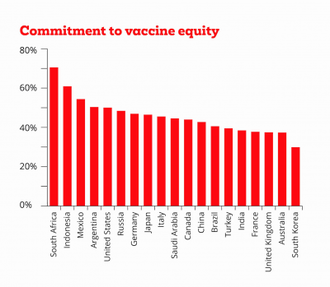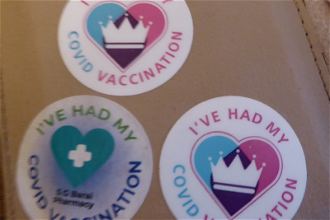Christian Aid demands action as UK ranks 17th in Covid league table

In a new analysis of the efforts of rich countries to support the rollout of Covid-19 vaccines in the global south, Christian Aid has warned the UK is not doing enough and is calling for action to increase vaccine production and distribution.
The international development charity's interim chief executive, Patrick Watt, is urging the UK Government to "act on these lessons in real time in order to recover from the pandemic" and said, "it is not promises that people need, it is vaccines."
The Covid vaccine equity index, endorsed by the People's Vaccine Alliance and former Prime Minister Gordon Brown, was commissioned amidst the threat of Omicron in response to an increasing gap between vaccination rates between the global south and rich countries.
According to the World Health Organisation, six adults are receiving their booster shots in middle-and high-income countries for every one adult in a low-income country receiving their first course of a vaccine.
Based on research by the ODI, the index ranks countries in the G20 in three areas: how much they are financing vaccines globally; how far their procurement of vaccines has helped global distribution; and whether they are supportive of reforms to trade and manufacturing policies which could unlock a fairer supply globally.
Christian Aid ascribed double weight to the issue of a waiver on intellectual property which, if agreed by G20 countries, the charity says would allow vaccine producers in the global south to manufacture without fear of legal repercussions.
The index ranks South Africa at the top though, according to analysis, still conducting only 70% of what the Christian Aid and the People's Vaccine Alliance expect governments to do to support vaccine equity. The United Kingdom is 17th of the G20 countries.
In places like Kenya, Sierra Leone and Burundi, Christian Aid is working with partners to tackle vaccine misinformation and believes a comprehensive debt cancellation package is essential to help low-income countries vaccinate their people.
Christian Aid's interim chief executive, Patrick Watt, said: "As Christian Aid is witnessing in places like Kenya, Sierra Leone and Burundi, the failure to roll out vaccines globally is destroying lives and slowing economic recovery. It doesn't need to be this way, but as shown by our comprehensive index, no one rich country is doing nearly enough to promote global vaccine equity, and certainly not the United Kingdom.
"The best way to reduce the risk of vaccine-resistant variants is by ensuring universal access to vaccines. However, a lack of leadership has created a world of 'have jabs and have nots'. Rich countries have an obligation to remove the barriers preventing the rapid rollout of vaccines in the global south. That means urgently waiving patents, which the UK has shamefully opposed, priority for healthcare and a debt cancellation package.
"It is not promises that people need, it is vaccines. We must act on these lessons in real time in order to recover from the pandemic."
Christian Aid's interim chief executive, Patrick Watt, former Prime Minister and WHO Ambassador for Global Health Financing, said: "Christian Aid's index is a reminder that greater strides must be taken to finance the vaccination of the whole world and protect the poorest countries from the terrible effects of Covid-19. The challenge to richer countries, including the UK, is to finance the vaccinations, testing and medical equipment needed in low-income countries. It is a challenge we must rise to."
Chair of the People's Vaccine Alliance and head of inequality for Oxfam, Max Lawson, added: "The People's Vaccine Alliance have continually argued rich countries must do more to tackle extreme vaccine inequality. This index documents clearly their appalling failure to do so, a failure that has cost millions of lives. A failure of historic proportions. The fair global distribution of vaccines isn't about charity; it is about justice and keeping promises. It is about doing what is right.
"Every barrier to accessing these crucial vaccines and treatments must be cleared away, including waiving of all intellectual property to end big Pharma monopolies and enable developing countries to make their own vaccines."


















